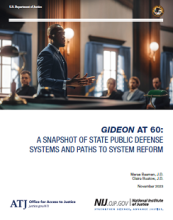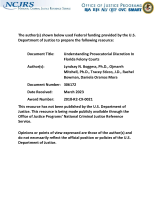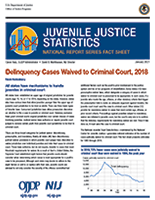Defendants
Assessing the Impact of Dade County's Felony Drug Court, Final Report
Assessing the Impact of Dade County's Felony Drug Court: Executive Summary
Pretrial Decisions - A Contextual Analysis of Central Intake Systems
Tracing Charge Trajectories: A Study of the Influence of Race in Charge Changes at Case Screening, Arraignment, and Disposition
Reducing Courts’ Failure-to-Appear Rate by Written Reminders
INFLUENCE OF INCOME AND OTHER FACTORS ON WHETHER CRIMINAL DEFENDANTS GO TO PRISON
IMPROVING DEFENDER-CLIENT RELATIONS
Does GPS Supervision of Intimate Partner Violence Defendants Reduce Pretrial Misconduct? Evidence From a Quasi-experimental Study
How Much Difference Does the Lawyer Make? The Effect of Defense Counsel on Murder Case Outcomes
“You feed and water a rose bush and eventually it blossoms”: Constructions of self-transformation among mental health court defendants.
Gideon at 60: A Snapshot of State Public Defense Systems and Paths to System Reform
Minority Victim Neglect and the Case Processing of Firearm Crimes
He Will Not Leave Us Alone and I Need the Courts to Help": Defendants' Use of Nonphysical Violence in Domestic Violence Protective Order Cases
Building Better Indigent Defense Systems
Where is the Evidence? Comparing the Effects of Evidence Strength and Demographic Characteristics on Plea Discounts
Understanding Prosecutorial Discretion In Florida Felony Courts
The Evolving Character of Public Defense: Comparing Criminal Case Processing Effectiveness and Outcomes Across Holistic Public Defense, Traditional Public Defense, and Privately Retained Counsel
Distinguishing Corruption in Law and Practice: Empirically Separating Conviction Charges From Underlying Behaviors
Early Representation by Defense Counsel Field Test - Final Evaluation Report
Booker and Beyond Analyzing Sentencing Reform and Exploring New Research Directions
This webinar features a discussion of previously published research on the U.S. Supreme Court’s 2005 Booker decision - which effectively transformed the United States Sentencing Guidelines from a mandatory, to an advisory, system. The presentation will address selected research findings from the last 15 years. Individual participants will briefly review their previous research findings with particular attention paid to the analytic methods used.
See the YouTube Terms of Service and Google Privacy Policy





